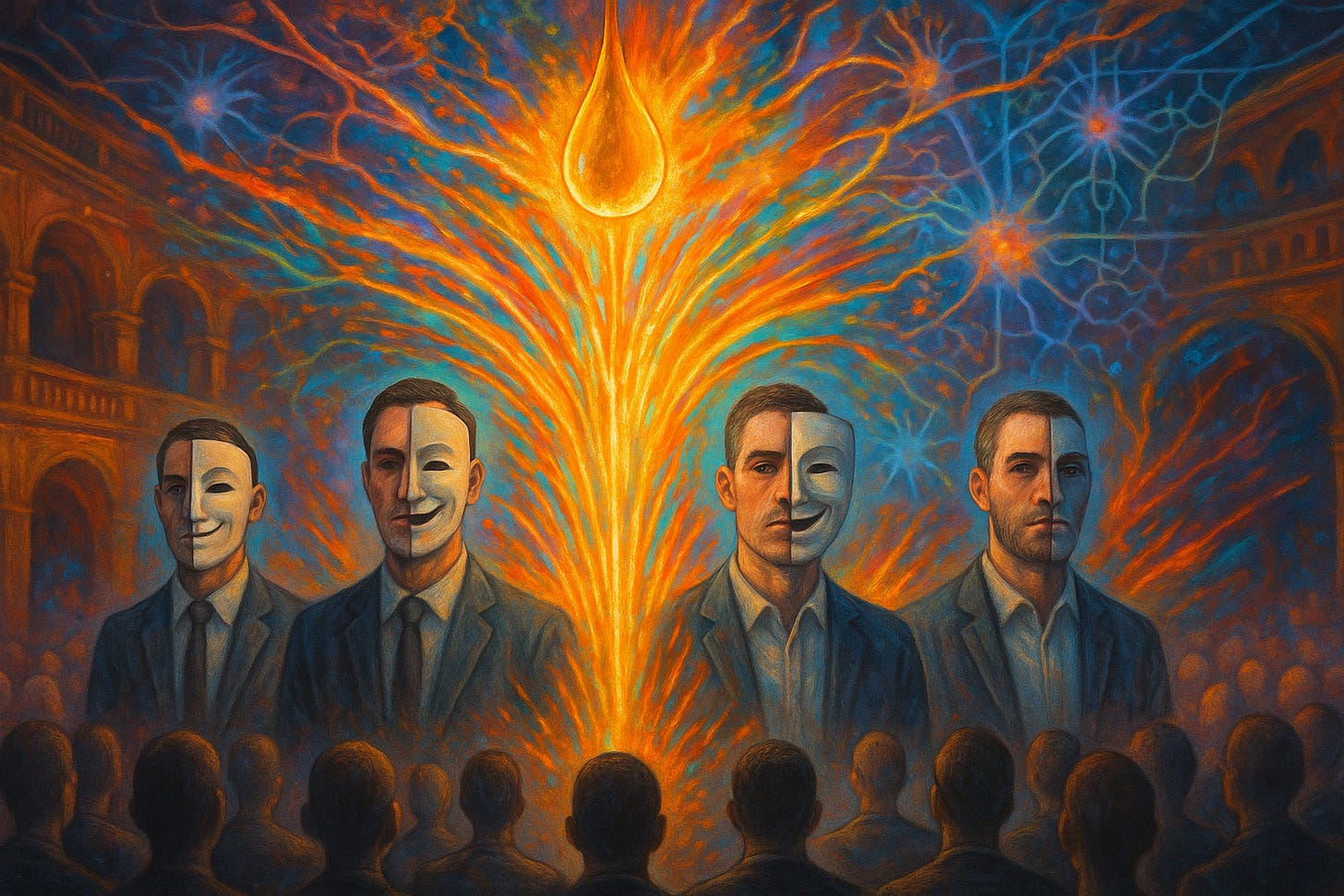Why Men Stop Faking Nice When Testosterone Takes the Wheel
A hormone study reveals how testosterone strips away social masks and strategic kindness
Ever notice how some people seem immune to social pressure while others constantly adjust their behavior based on who's watching? A groundbreaking study just revealed that testosterone literally eliminates men's tendency to perform charitable acts for an audience—and since I started taking Cistanche and boron to increase my androgen levels, I've noticed that drive and zest for life comes with an interesting side effect: caring less about performing for others.
"Testosterone completely erased this audience effect—the hormone essentially freed them from the exhausting game of reputation management."
What's the Big Idea?
Researchers at the University of Vienna gave 192 healthy men either 150mg of testosterone gel or a placebo, then had them complete learning tasks that earned money for themselves or charity. The twist? Half performed while being watched by female observers introduced as NGO representatives. Men on placebo became 43% more generous when observed—classic strategic prosociality. But testosterone completely erased this audience effect.
The computational modeling here fascinated me. Using a sophisticated approach combining reinforcement learning with decision-making models, researchers discovered testosterone didn't impair learning ability. Instead, it specifically disrupted "choice consistency"—how reliably men converted learned reward values into prosocial actions when being watched. The hormone essentially freed them from the exhausting game of reputation management. This resonates with my own experience—that increased drive from higher androgen levels seems to come packaged with a reduced need to maintain social facades.
Why Should You Care?
This research explains a phenomenon many of us experience daily: the exhausting performance of being "good" when others are watching. If you've ever felt drained from networking events, struggled with people-pleasing, or wondered why some colleagues seem effortlessly authentic while others constantly manage impressions, this study offers biological insights.
The implications extend beyond social niceties. Men with naturally higher trait dominance showed even stronger testosterone effects, suggesting hormone levels and personality interact to shape everything from leadership styles to relationship dynamics. Since boosting my own androgen levels, I've noticed not just increased energy but also a shift in how I approach social situations—less calculated, more direct. This isn't necessarily better or worse, but understanding these mechanisms helps explain why some optimization strategies affect more than just physical performance.
For those interested in cognitive enhancement and biohacking, this reveals testosterone's role transcends simple aggression or muscle building. It fundamentally alters how we process social rewards and manage our public personas.
What's Next on the Horizon?
The research opens fascinating questions about biological individuality. The study found that men emphasizing "self-enhancement" values (power, achievement) showed stronger testosterone effects, while those valuing "conservation" (conformity, tradition) responded differently. Future research needs to explore how other hormones like oxytocin or cortisol interact with these effects.
Intriguingly, while this Western sample showed testosterone eliminating strategic prosociality, a previous Chinese study found the opposite—testosterone enhanced audience-driven generosity there. This suggests culture shapes how biology influences behavior, opening new avenues for personalized intervention strategies.
The computational modeling approach used here offers powerful tools for understanding hidden decision-making processes. We're moving beyond simple "testosterone makes you aggressive" narratives toward nuanced understanding of how hormones shape the complex calculations underlying social behavior.
Safety, Ethics, and Caveats
This controlled study used pharmaceutical-grade testosterone under medical supervision—not a recommendation for DIY hormone optimization. While no adverse effects occurred here, testosterone supplementation carries real risks: cardiovascular issues, mood changes, sleep disruption, and potential long-term hormonal imbalances.
The study only included male participants watching female observers, limiting broader applicability. We don't know how these effects translate to women or same-sex observation scenarios. Additionally, eliminating strategic prosociality isn't inherently positive—reputation management, even when performative, serves important social functions like building trust and cooperation.
What This Could Mean for You
While you shouldn't rush to alter hormone levels, understanding these mechanisms offers practical insights. If you're exploring natural testosterone optimization through exercise, nutrition, or supplements like Cistanche and boron as I have, be aware that increased androgen levels might affect more than physical performance—they could fundamentally alter your social decision-making patterns.
For those in leadership, recognize that high-testosterone individuals may respond better to direct, authentic communication rather than strategic displays of concern. Conversely, understanding your own hormonal tendencies helps identify when you're performing versus being genuine.
Consider examining your value system. If you prioritize achievement and power, higher testosterone might amplify your resistance to social pressure. If you value tradition and conformity, the effects might manifest differently. The goal isn't to eliminate all strategic behavior—sometimes performing prosociality serves important relationship and career functions—but rather to recognize when you're choosing to perform versus feeling compelled to.
Most importantly, this research suggests that feeling exhausted by constant social performance might have biological underpinnings. Some people are literally wired to care less about audience expectations. Understanding this can reduce self-judgment and help you design social strategies that align with your biological tendencies rather than fighting against them.
Explore the Full Study
Testosterone eliminates strategic prosocial behavior through impacting choice consistency in healthy males - Published in Neuropsychopharmacology (2023)



